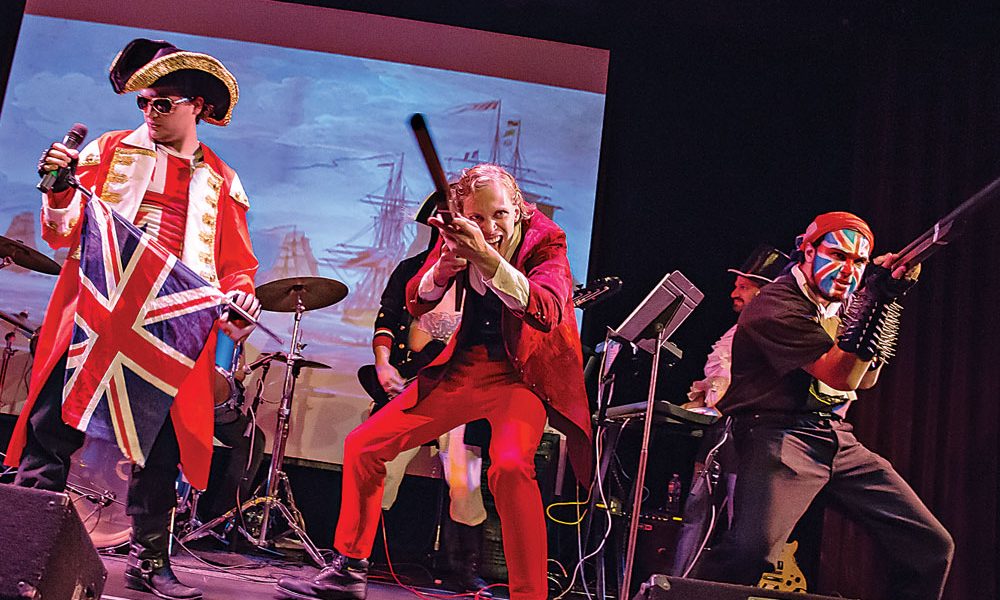Arts & Culture
Stars, Stripes, and Guitars
An 1814 rock opera cleverly mixes U.S. history and heavy metal.
The warehouses along Whittington Avenue in Morrell Park appear to be deserted on a summer’s night. The only sign of life at Mid-Atlantic Rubber is a black cat drinking from a puddle. But across the street, what looks like a sprawling storage facility hums with activity.
A few dozen cars and trucks occupy the parking lot, and the curious sound of music floats through the air. Country rock wafts through the open door of a loading dock, and muffled heavy metal pulsates from within the building, which houses dozens of band rehearsal spaces.
In a cramped room behind a nondescript gray door, practice for 1814! The War of 1812 Rock Opera begins with a round of warm greetings and cold beers. Some cast members haven’t seen each other since last performing the show—a sassy musical-theater piece that weds historical events, including the British burning of Washington, D.C., and the Battle of Baltimore, to an arena rock score—in 2013. They’re gearing up for a September 14 performance at Patterson Park.
As bottles of Miller High Life and cans of Natty Boh are opened, Laura Schneider (who plays Dolley Madison), Derek Vaughan Brown (General Robert Ross), and Tim Olewnik (General Sam Smith) exchange war stories from last July’s run of sold-out shows at D.C.’s Capital Fringe Festival. “It was amazing,” recalls Schneider. “Everyone was sweating, losing their minds, and dancing in the aisles, just rocking out.”
Brown notes that it was especially satisfying doing this particular show in the nation’s capital. “The story is basically, Washington got burned down, and us Baltimoreans saved the entire country,” he says, laughing. “You gotta love that.”
“And it was awesome to see people at a rock show, getting some history,” says Olewnik. “We love making historical figures into rock stars. Why not make Dolley Madison sound like Pat Benatar or Joan Jett if it pulls more people into the story?”
The Washington Post lauded that approach and praised the production’s “music, moves, and impressive voices.”
Historian Stephen Vogel, author of Through the Perilous Fight, which deals with roughly the same events, was similarly impressed. “I loved it both as a piece of historical storytelling and as an absolute rock spectacle,” says Vogel, who saw the show twice. “I was relieved to find that it is overall quite faithful to the facts. Plus, I couldn’t stop laughing. I bought the CD and play it to get psyched up when I’m driving to speaking engagements about the book.”
The unlikely project began in the early 1990s, when co-creators Dave Dudley and Dave Israel shared a house on Fort Avenue, not far from Fort McHenry. The Daves (as they’ve come to be known by their rock-opera cohorts) hosted an annual party on Defender’s Day, the holiday celebrating the defense of the city, and at one point, their Defender Bender included a puppet show about the events of 1814. Inspired, the Daves, who played together in the local band Dr. Tasty, started envisioning a Battle of Baltimore rock opera.
Israel says they wrote most of the songs at that time, with much of the music inspired by the hard rock of their youth. The results reveal a sly appreciation for their source material, as the character of British Admiral George Cockburn, for instance, evokes English metal gods Iron Maiden and Judas Priest, while singing “Burning Down the White House.” American General Samuel Smith’s “Black Powder” conjures U.S. rockers Ted Nugent and Kiss.
“It’s perhaps the most derivative of all the songs,” Dudley says of the latter tune.
“I don’t know if it’s the most,” adds Israel, before noting that he and Dudley often joked about completing the rock opera in time for the 2012 bicentennial.
As 2012 approached, the Daves still hadn’t finished. Jobs, marriages, and children had taken priority, but, in a furious burst of activity, they completed the music (exchanging e-mails with subject lines like, “What would Ozzy do?”), assembled a core band (that includes drummer Jim Schaffer, bassist Erik Sunday, and guitarist Carl Weigel), and recruited vocalists from the Baltimore Rock Opera Society. “The singers gave the whole thing a life of its own and really made it a theatrical spectacle,” says Israel.
“The show definitely has a certain insane exuberance,” says Dudley. “Its greatest asset is its relentlessness and a kind of goofy Broadway energy that builds to a crescendo.”
Considering the many musical references (including some country and synth-pop in the mix) and historical figures populating the show, there seems to be one glaring omission in 1814!—no Francis Scott Key.
The reason for that, says Dudley, is simple: “He’s already got his song.”

